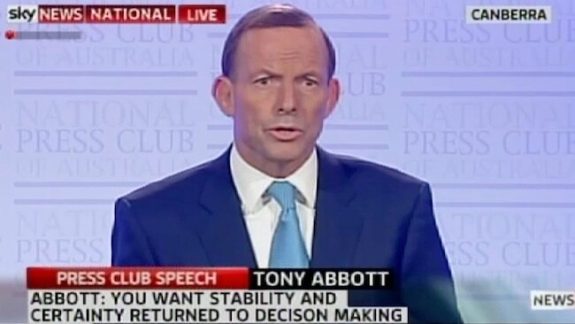This is the Dawning of the Age of Consultancy

Before the election the Coalition announced a series of inquiries, reviews and white papers that it would instigate if it were elected. They included:
- Commission of Audit
- Inquiry into the Financial Sector
- Review of Competition Policy
- Judicial Inquiry – Home Insulation Programme
- Review of the Department of Defence
- Coal Seam Gas Management and Wind Farms
- Inquiries into the National Broadband Network – The Coalition will conduct three inquiries as part of its “Plan for a Better NBN”.
- Inquiry into the Australian Tax Office
Productivity Commission Inquiries and Reviews
- Inquiry into Child Care Funding
- Review of Industrial Relations
- Review of the Automotive Industry
White Papers
The Coalition will produce White Papers on the following:
- Tax Reform
- Direct Action Plan
- Federal-State Relations
- Defence
- Development of Northern Australia
- Resources and Energy
Since the election, that list has grown.
Sussan Ley was up and running, commissioning a report from PriceWaterhouseCoopers into child care funding. Apparently she couldn’t wait for the results from the inquiry that the Productivity Commission was already conducting
Coincidentally, the North Sydney Forum, a campaign fundraising body for Joe Hockey whose $22,000 annual membership fee is rewarded with “VIP” meetings with Mr Hockey, was established in 2009, shortly after Joe became shadow treasurer, by Joseph Carrozzi, managing partner at professional services firm PriceWaterhouseCoopers.
Mr Carrozzi is also chairman of the Italian Chamber of Commerce and Industry in Australia and was a board member of the organisation when Nick Di Girolamo was its chairman.
Members of the forum include National Australia Bank as well as the influential Financial Services Council, whose chief executive is former NSW Liberal leader John Brogden.
The FSC’s members, including financial advice and funds management firms, stand to benefit from the changes to the Future of Financial Advice (FOFA) laws. The National Australia Bank would also benefit from the changes.
The chairman of the North Sydney Forum is John Hart, who is also the chief executive of Restaurant and Catering Australia – a hospitality industry lobby group whose members stand to benefit from a government-ordered Productivity Commission review of the Fair Work Act that is expected to examine the issue of penalty rates.
Mr Hart also sits on Prime Minister Tony Abbott’s Business Advisory Council.
The National Commission of Audit was officially announced by Treasurer Joe Hockey, and Finance Minister Senator Mathias Cormann, on October 22, 2013, to be led by Tony Shepherd, former Business Council of Australia president and chairman of Transfield Services.
Mr Shepherd’s appointment was seen as being particularly controversial because as head of the BCA he had been critical of the previous Labor government policies such as the National Disability Insurance Scheme and the Gonski schools funding reforms.
His appointment was also questioned because of his links to companies that had benefited from government contracts.
Mr Shepherd stepped down as chairman of Transfield Services upon his elevation to the Commission of Audit. Transfield, a construction and services firm, won a string of contracts in recent years worth hundreds of millions of dollars, including the contract for maintenance and support services at the Nauru detention centre.
The other commissioners are former senator and minister in the Howard government, Amanda Vanstone, and former senior public servants Peter Boxall, Tony Cole and Robert Fisher.
The coalition predicted in its midyear Budget update that the commission would spend about $1 million but figures show it cost taxpayers about $2.5 million to produce the audit. That’s a 150% budget blowout from the panel advising us how to “live within our means”.
It cost $1.9 million for expert staff drafted in from the departments of Finance, Treasury and the Prime Minister and Cabinet to work on the study.
The head of the commission’s secretariat, Peter Crone, was paid $157,000 to oversee the probe, while the commissioners were paid $85,000 each for their five months work.
Consultants Boston Consulting Group were paid $50,000.
And then there’s the NBN.
As the rollout of superfast broadband slows down across the country, consultants have been the biggest winners, pocketing millions of dollars from numerous reviews and cost-benefit analyses.
A Question on Notice tabled in Federal Parliament revealed the external consulting cost for the NBN was $10.1 million. The cost of implementing the recommendations was not included, the 2016 deadline has been abandoned, and the new agreement with Telstra is yet to be concluded.
Boston Consulting Group, KordaMentha and Deloitte Touche Tohmatsu received the biggest financial boon from the government-commissioned reviews.
Then there are the Royal Commissions.
The Government will provide $53.3 million over two years (including $5.3 million in capital funding) to conduct the Royal Commission into Trade Union Governance and Corruption.
The cost of this measure will be offset by redirecting funding from the Employment, Industry and Infrastructure and Regional Development portfolios.
Even though there have been coronial enquiries, inquests, administrative investigations and a full government audit report into the Home Insulation Programme’s problems, Abbott found another $25 million for a Royal Commission.
We then have the Warburton led review into the Renewable Energy Target. The Climate Change Authority was legislated to conduct this review, which they will still do to “keep them occupied” according to Greg Hunt. To get the results he wanted, he chose to conduct his own review led by climate change sceptic Dick Warburton and representatives of fossil fuel producers and users.
A Senate Committee was told the total cost of the review was $587,329. That figure does not include the salaries of the staff on the secretariat or overheads such as IT and accommodation.
Mr Warburton received fees in the order of $73,000; Mr Fisher $39,900; Ms In’t Veld, $43,900; and Mr Zema, $29,700.
Clean energy representatives were shocked by the panel’s appointment as chief advisor and modeller of ACIL Allen, a consultancy seen as close to the fossil fuel industry, and whose highly contested research formed the basis of the coal industry’s attempts to dismantle the RET in 2012.
They refused to include in their modelling the benefits of renewable energy – including the health benefits, job benefits, and the network benefits – which the panel dismissed as “too hard to model” and little more than a “transfer of wealth”, presumably away from the coal generators and network providers.
ACIL Allen were paid $287,468 for their modelling
We also have seen Christopher Pyne’s National Curriculum Review which cost $283,157 to tell us we need less Indigenous focus and more Judeo-Christian, less creativity and more rote learning, and less about progressive reform and more about business.
Kevin Donnelly and Ken Wiltshire appointed 16 external experts to make contributions, including Barry Spurr, each of whom were paid $8250 for their reports.
This government’s intentions are clear. They have bypassed government departments and statutory bodies, ignored expert advice and the results of previous reviews, to pay hundreds of millions to consultants, vested interests, and party hacks to produce the results that endorse their stated policies or that damage the previous government.
This is indeed the Age of Consultancy.
Like what we do at The AIMN?
You’ll like it even more knowing that your donation will help us to keep up the good fight.
Chuck in a few bucks and see just how far it goes!
Your contribution to help with the running costs of this site will be gratefully accepted.
You can donate through PayPal or credit card via the button below, or donate via bank transfer: BSB: 062500; A/c no: 10495969










